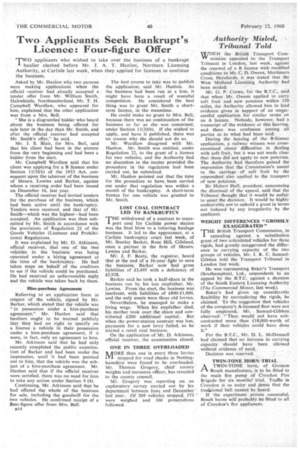Two Applicants Seek Bankrupt's Licence: Four-figure Offer
Page 48

If you've noticed an error in this article please click here to report it so we can fix it.
fWO applicants who wished to take over the business of a bankrupt haulier clashed before Mr. J. A, T. Hanlon, Northern Licensing Authority, at Carlisle last week, when they applied for licences to continue the business.
Asked by Mr. Hanlon why two persons were making applications when the official receiver had already accepted 'a. tender offer from Mr. William Smith, Haltwhistle, Northumberland, Mr. T. H. Campbell Wardlaw, who appeared for him, explained that the other application was from a Mrs. Bell.
"She is a disgruntled bidder who heard about the business being offered for sale later in the day than Mr. Smith, and after the official receiver had accepted Mr. Smith's offer," he said.
Mr. J. S. Blair, for Mrs. Bell, said that his client had been in the picture from the very beginning and had been a bidder from the start.
Mr. Campbell Wardlaw said that his client was applying for a B licence under Section I1(3)(b) of the 1933 Act, consequent upon the takeover of the business of Messrs. Lewins and Barker, against whom a receiving order had been issued on December 16, last year.
The official receiver had invited tenders for the purchase of the business, which had been active until the bankruptcy. Tenders were received, and that of Mr. Smith—which was the highest—had been accepted. An application was then submitted by Mr. Smith in accordance with the provisions of Regulation, 22 of the Goods Vehicles (Licences and Prohibitions) Regulations.
It was explained by Mr. D. Atkinson, official receiver, that one of the two' vehicles in the business was being operated under a hiring agreement at the tithe of the bankruptcy. He had taken steps on behalf of the creditors to see if the vehicle could be purchased. He had received an unfavourable reply and the vehicle was taken back by them.
Hire-purchase Agreement
Referring to an application form in respect of the vehicle, signed by Mr. Barker, which stated that the vehicle was "in possession under a hire-purchase agreement," Mr. Hanlon said that hauliers ought to be warned publicly that they had no right to specify, on a licence a vehicle in their possession under a hire-purchase agreement, if it were, in fact, only an agreement to hire.
Mr. Atkinson said that he had only recently completed the public examination of Barker and had been under the impression, until it had been pointed out to him, that the vehicle was the subject of a hire-purchase agreement. Mr. Hanlon said that if the official receiver were satisfied, there was no need for him to take any action under Section 9 (4).
Continuing, Mr. Atkinson said that he had offered the whole of the business for sale, including the goodwill for the two vehicles. He confirmed receipt of a four-figure offer from Mrs. Bell.
n14
The best course to take was to -publish the application, said Mr. I-lanlon. As the business • had been run at a loss, it might have been a result of wasteful competition. He considered the best thing was to grant Mr. Smith a short-term licence, in the meantime.
He could make no grant to -Mrs. Bell, because there was no continuation of the business so far as she • was concerned, under Section 11(3)(b). If she wished to apply, and have it published, there was no reason why she should not do so.
Mr. Wardlaw disagreed with Mr. Hanlon. Mr. Smith was entitled, under Regulation 22, to the grant of a licence for two vehicles, and the Authority had no discretion in the matter provided the procedure in the regulation had been carried out, he submitted.
. Mr. Hanlon pointed out that the time for the procedure to have been carried out under that regulation was within a month of the bankruptcy. A short-term licence for one vehicle was granted to Mr. Smith.
LOST COAL CONTRACT LED TO BANKRUPTCY 'THE withdrawal of a contract to transI port coal for Carlisle power station was the final blow to a tottering haulage business. It led to the appearance, at a Carlisle bankruptcy court last week, of Mr. Stanley Barker, Rose Hill, Glisland, once a partner in the firm of Messrs. Lewins and Barker.
Mr. J. F. Beaty, the registrar, heard that at the 'end of a 16-year fight to save the business, Barker now had gross liabilities of £3,495 with a deficiency of £2,928.
Barker said he took a half-share in the business run by his late stepfather, Mr. Lewins. From the start, the business was insolvent, with liabilities of £80041,000, and the only assets were three old lorries.
Nevertheless, he managed to make a living wage. When his stepfather died, his mother took over the share and contributed £200 additional capital. But when the power-station contract was lost, payments for a new lorry failed, so he started a retail coal business.
On the application of Mr. D. Atkinson, official receiver, the examination closed.
ONE IN THREE OVERLOADED MORE than one in every three lorries M stopped for road checks in Nottinghamshire were found. to be overloaded, Mr. Thomas Gregory, chief county weights and measures officer, has revealed to the county council. Mr. Gregory was reporting on an exploratory survey carried out by his department between June and December last year. Of 269 vehicles stopped, 173 were weighed and 1.06 prosecutions Followed,




















































































































